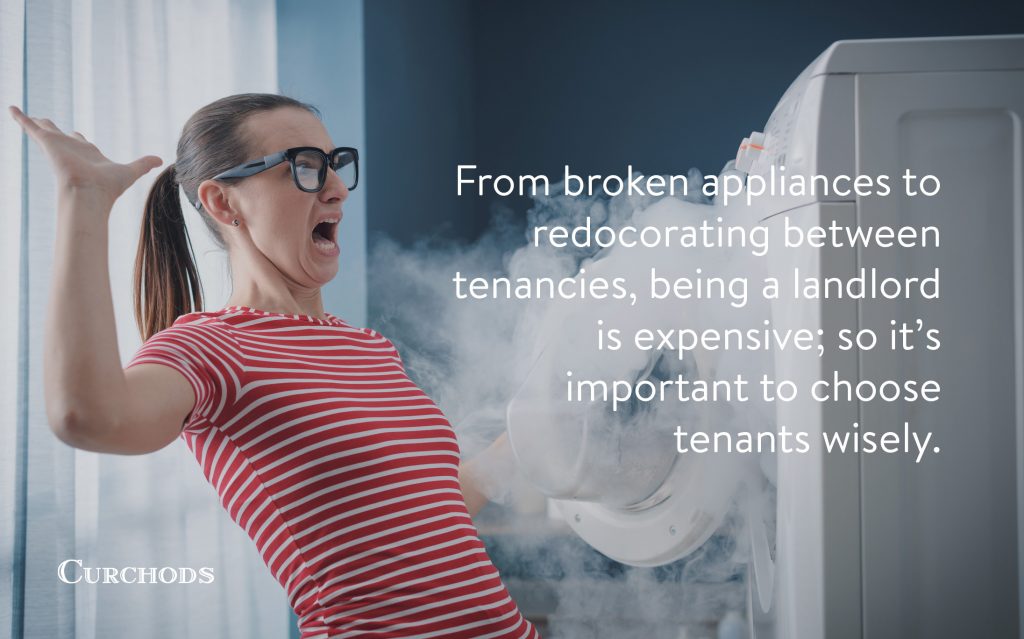

Adam Lockett
Head of Lettings
21st July 2021
As a landlord, when the time comes to find a tenant for your property, achieving the highest rental income per month from the tenants, in order to help you maximise the return on your investment is key.
There’s no denying that being a landlord can be expensive. Whether the boiler breaks or a new piece of legislation comes out, it will inevitably cost money, so it is understandable that most landlords focus on getting the highest possible rent per month to cover their mortgage on the property and all maintenance costs. However, there are some other considerations to take into account.

Changing tenants every year or every 6 months with vacant periods inbetween is going to be vastly more costly than having a longer term tenant. Even if it means accepting a slightly lower rental figure per month over a much longer term.
The problem is compounded every time you change tenants as you will have to clean the property inbetween tenancies and pay for inventory costs at the start of each new tenancy. In a recent survey, cracks, marks and stains leave the biggest negative impression on prospective tenants during a viewing, with a 76% turn-off rate.
Getting a good rental price is obviously still important, but for any landlord, finding a tenant that stays for the maximum length of time will ensure you get the maximum rental yield over the life of your Buy to Let investment.

As a landlord, when you’re selecting a tenant for your property the best advice we can give you is to not necessarily pick a tenant simply because they are prepared to pay the highest rent; you need to look at the whole offer, including the background of the tenant and third party reference checks can help you do this:
Some useful tips to help you assess the quality of the tenant:
To help you get all this information, third party reference checks play an essential role in this process.
Third party reference checks provide the landlord with impartial information about the tenant, so you don’t solely have to rely on the advice of the letting agent.
As a landlord, the best way to mitigate the risk of entering into a dispute with a tenant at the end of a tenancy is to put emphasis on finding good quality tenants who rent longer term from the outset.
In our experience many tenants are now far more comfortable agreeing to longer (two, three or even four year) tenancies because they understand that it’s better for them as a tenant as they can think of it more like their home and therefore look after it better, plus they have the added security of being able to budget longer term. Longer term tenancies can also financially benefit landlords for the reasons we’ve talked about in this article.
As the last year has shown with the Covid pandemic nothing is for certain, so choosing a good managing agent can help mediate in this regard should the deposit ever enter into a dispute.

The latest data shows that tenant demand is rising substantially. Analysis of tenancy start dates based on data from the past 5 years indicates the market starts to accelerate in June, with nearly one third of all tenancies starting between July and the end of September.
With competition for rental properties so high, it’s not uncommon that we’ll see several tenants competing for the same property. But how do you make yourself stand out as a first rate tenant, most likely to be picked by the landlord?
Our advice to tenants is to always offer the maximum amount of rent you can afford, for the longest duration you’re happy to commit to.
More than a quarter (28%) of tenants have lived in the private rented sector for over a decade and four in ten don’t expect to buy within the next five years so offering a longer duration often suits tenants.
A longer term tenancy provides more stability for both the tenant, but also more financial security for the landlord.
If you would like more information on any topics discussed in this article, contact Adam Lockett, Head of Lettings adam-lockett@curchods.com